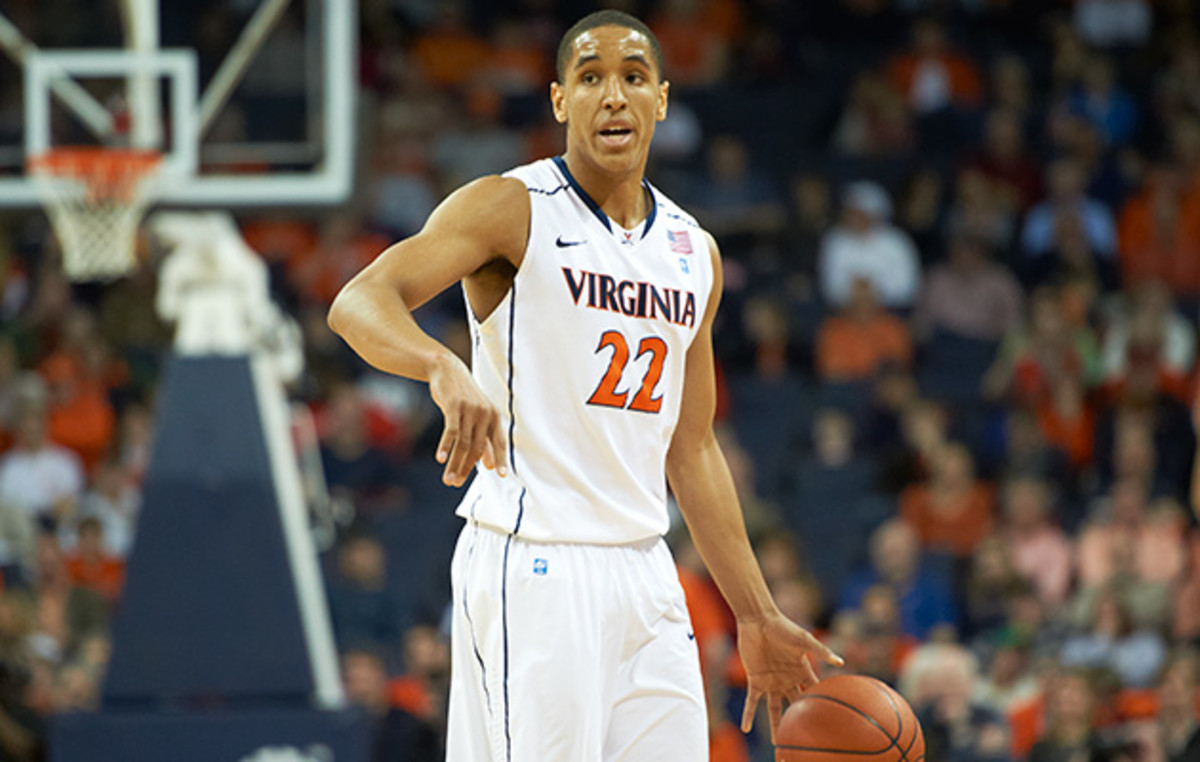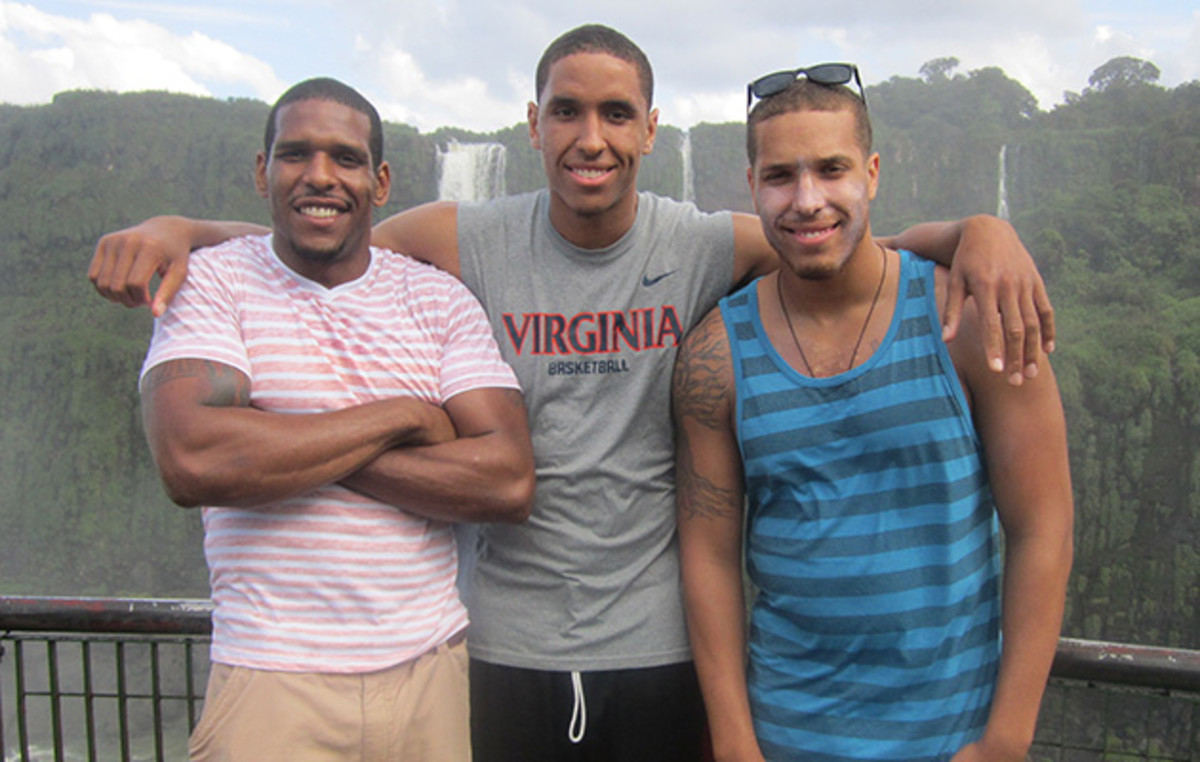Malcolm Brogdon knows his impact can extend well beyond the hardwood

About six months ago, Malcolm Brogdon mulled leaving Virginia for the NBA. At ACC Media Day prior to the season he had promised that he would return for a fifth season no matter what—that it was “set in stone.” But still, he wanted to consider all his options this spring. Had he accomplished all he could at Virginia? He had bounced back from a broken foot suffered his freshman year to start 71 consecutive games in two seasons, earning All-ACC honors twice and becoming a second-team All-America a year ago. He was weeks away from graduating with a history degree, too. But when he called his mother to seek advice, she reminded him that he had unfinished business.
His thoughts first turned to an elusive national championship. For all the Cavaliers' regular-season success, the NCAA tournament had been cruel the past two seasons. As a No. 1 seed in 2014 and a No. 2 seed last year, they were bounced by Michigan State in the Sweet 16 and second round, respectively. They lost both games by a combined seven points. But Jann Adams, Brogdon’s mom, wasn’t thinking of trophies when she asked her son to stay. She was thinking about his education, which she deemed far from finished. She wanted him to stay to get his graduate degree.
“In my family, graduating and getting your bachelor’s is just the beginning,” Brogdon says. “It’s only expected. You’re underachieving if you don’t strive for more than that.”
Brogdon’s great-grandparents were college educated. His grandfather on his mother’s side has a master’s in divinity, and his grandmother a doctorate in education. His father, Mitchell, is a lawyer and mediator in Atlanta; his mother has a Ph.D. in clinical psychology and is the associate provost for faculty at Morehouse College. His oldest brother, Gino, is a practicing attorney in Atlanta. His other brother, John, is also in law school at Howard. And every one of them believes that Malcolm is the most dedicated and driven member of the family.
It’s a sentiment that his teammates and coaches echo as well. No one was surprised when Brogdon decided to stay for a graduate senior season, but everyone—especially coach Tony Bennett—was grateful. In his house, Brogdon is sometimes called Humble Moses, a riff on his most notable attribute and his middle name. But around the locker room, he’s picked up another nickname: president. It’s partly a joke about how carefully he speaks and how intensely he approaches everything from practice to academics. But it’s also a serious reflection by those around him that his most significant accomplishments will likely come off the court.
*****
When he was about 10 years old, Brogdon went with his family to Ghana. Although his family holds a strong Christian faith—that grandfather with a divinity degree is a pastor—this trip was designed to be more educational and service-oriented than spiritual. Most nights, they’d listen to lectures on the country’s history; during the day, they either toured the capital, Accra, or worked at a daycare facility.
It didn’t take Brogdon long to see the differences between what he’d grown up with and the situation for the children here. When he played them in soccer—his favorite sport at the time—he noticed that few of his opponents wore shoes. And they had to stop playing every day when the region’s trash was dumped not 20 feet from the school.
But the most powerful experience came near the end of the trip, as they were boarding a bus to leave a university tour. It was near lunchtime, and everyone was hungry. The tour guide had prepared sack lunches of rice and chicken and distributed them to the group. Outside the bus, children were banging on the windows, begging for something to eat. The adults decided that they would give their lunches away, but they didn’t make the children follow suit—instead, they let them decide for themselves. Brogdon and his brothers reached out the windows and offered their lunches.
After the quake: Skal Labissiere’s incredible journey to Kentucky
“As a young kid, you don’t want to give up your food,” he says. “But then you realize that they’re really hungry, and they really don’t have anything. No one should be living like that. It’s not fair.”
The entire family was transformed by that trip. Brogdon is the baby of the family, and it took some time for his feelings to manifest into action. But it wasn’t more than four years before he returned to Africa, this time to Malawi on a missions trip. He had a sense even then that he wanted to devote his life to helping others, but he wasn’t sure how that would work yet. In the interim, he focused on school and sports.
He quit soccer in eighth grade so he could focus solely on basketball. Around that time, his parents divorced, and Adams assumed most of the responsibility for Malcolm’s extracurricular activities. She had a rule for her sons—as long as they maintained a B average in school, she would let them invest however much time they wanted in any other activity. Gino chose wrestling and football while John and Malcolm focused on basketball. Malcolm, as usual, was the most serious. He would wake up 5:30 a.m. to have breakfast and then work out with a personal trainer. After school, he’d have practice, then take practice shots for hours before coming in to do his homework and watch basketball on TV. “When he decided this was the path for him,” Gino says, “he committed to it completely. He ate, slept and breathed basketball.”
In the summer of 2010, he met Bennett, who had just become Virginia’s coach in 2009, at Peach Jam. Bennett thought it might be too late to get Brogdon, a 6'5" guard who held offers mainly from mid-major programs at the time but hadn’t yet committed. He called Brogdon anyway. “You could round it up to 10, but it couldn’t have taken more than eight minutes into our first conversation for the both of us to know that this was right,” Bennett says now. “I came to Virginia to be able to recruit players like Malcolm.”
His grandmother Dolly had wanted him to go to Harvard, to which he had an offer, but he felt that Virginia would give him the best combination of education and elite basketball competition. He also made the decision for practical purposes: Ivy League schools don’t offer scholarships, but ACC schools do. Although his parents would have gladly paid for him to go to Harvard, he wouldn’t allow it. “He was always like that,” Gino says. “Even when he was in high school, he would evaluate the cost and benefit of working out with trainers. If they weren’t helping him enough, he would stop working with them because he didn’t want to waste our mom’s money.”
After becoming Georgia’s Mr. Basketball as a senior, Brogdon enrolled at Virginia. He played 28 games his freshman year before breaking a bone in his foot in March and missing the final two games of the year and the postseason. The injury was so bad that he had to redshirt the following season as well. “My surgeon told me that most people don’t come back from this injury—it’s in a part of your foot where you get very little blood circulation and it’s very hard to heal perfectly. The chances were low I could come back.”

As he pondered a life without basketball, he and Bennett discussed the Bible’s book of Job. In the story, Job loses everything from his family to his wealth to his health, but maintains his faith. Brogdon realized in that year how much basketball meant to him—that he would pursue it as long as possible but that it wouldn’t define his entire life. He decided then that he would use his extra year of eligibility to earn a graduate degree. “That injury really opened up doors and opportunities for me that I couldn’t have seen without it,” Brogdon says. “I’m very thankful for it now.”
College basketball conference previews: ACC
After the 2014 season, during which Brogdon averaged a team-leading 12.7 points, 5.4 rebounds, 2.7 assists and 1.2 steals in 31.4 minutes a game, he and his brothers joined their mother on a trip to Brazil. Adams had been working on an international science training program there and decided to bring the boys along for a family trip where they could all experience another country together as adults.
There’s a joke among the Brogdon boys that Malcolm has no personality. Mostly, it’s a result of John’s and Gino’s strong personalities swelling over Malcolm’s, but it’s also a result of Malcolm’s intense focus on his goals.
“Sometimes I sound like Allen Iverson when I’m trying to get him to go out with us at nights,” Gino says. “I’m like, you’re talking about not going out because of practice. Not a game, but practice. But we did manage to get him to go out with us a couple times in Brazil.”
When Brogdon saw the poverty in the favelas of Rio de Janeiro right next to hotels that he knew would make hundreds of thousands of dollars a night at the Olympics and World Cup in the following years, it solidified in his mind what he wanted to do after basketball—start a non-profit or NGO (non-governmental organization). “After basketball is over, I want all my energy to go to that,” Brogdon says. “That’s my true passion. I want to transform people’s lives in third-world countries—give them clean water and food.”

*****
This season, Brogdon is enrolled in Virginia’s prestigious Batten School of Leadership and Public Policy. He also lives on the Range, an exclusive graduate housing community designed by Thomas Jefferson to be a place where professors and deans and students would interact daily. And he’s also the unquestioned leader of Virginia’s basketball team, which SI.com projects to compete with Duke and North Carolina for the ACC title. It also projects Brogdon to lead the Cavs in scoring for the second season in a row.
The balance of basketball and school keeps him plenty busy. He wakes up at 7:30 and is usually the first player at the gym. He works out till 10:30 then goes to class from 11 a.m. to 1:30 p.m. or 11:30 a.m. to 2 p.m. His 2.5-hour blocks of class forced Bennett to alter the team’s practice schedule, but he was happy to accommodate. After class, Brodgon eats and goes to practice from 3 p.m. to 5:30 p.m. Then it’s another meal before heading back to class from 7 p.m. to 9:30 p.m. If he has an hour or two to watch something on Netflix at the end of the day, he’s lucky.
• MORE: See SI.com’s complete college basketball preseason coverage
But despite how busy he is, he’s always looking for more opportunities to take advantage of while he’s at school. A couple weeks ago, he called his mother to ask if she could think of a creative solution to help him go on a trip to D.C. with a class he wasn’t even taking. “I was about to tell him, “I don’t think you can take this trip, Malcolm,’” Adams says. “He had two assignments due and he’d barely be back in time for practice. But he didn’t want to hear that. He hung up with me and called his advisor, and when he called me back, he had already figured everything out and was on his way.”
In D.C., he met with Virginia’s senators and came back inspired about changing people’s lives through policy. Maybe, he thought, he could work in government instead of at the Clinton Foundation or the Bill and Melinda Gates Foundation, which had been his two targets. Maybe, he thought, he could see himself in D.C. Maybe that nickname, president, is more meaningful than he might have ever imagined.
